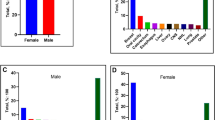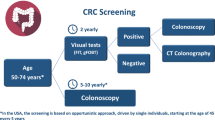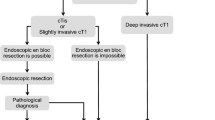Abstract
Background
We recently reported on a left-sided predominance of colorectal cancers in the young (under age 50). Given the predilection of young African Americans for the disease, we wondered if there may be a difference in the biology of colorectal carcinogenesis between this group and Caucasians.
Objective
Compare the distribution of colorectal cancer in African American patients and Caucasians under age 50, and describe implications for screening in these groups.
Patients
Colorectal cancer patients diagnosed under the age of 50 between the years 2000 and 2016. All races other than African American and Caucasian and all patients with hereditary colon cancer or inflammatory bowel disease were excluded. Outcome measures: race, age at diagnosis (5 subgroups: < 20, 20–29, 30–39, 40–44, and 45–49 years) and cancer location; right (cecum, ascending colon, hepatic flexure, transverse colon, splenic flexure), left (descending colon and sigmoid colon), or rectal.
Results
759 patients were included; 695 (91.6%) were Caucasian and 64 (8.4%) were African American. Most cases were diagnosed between ages 40 and 49 (African American = 75%, Caucasian = 69.5%). Rectal cancer was most common in both races, although significantly more common in Caucasian than in African American patients (64.2% vs 39.1%). Right colon cancer was more commonly found in African Americans (37.5%) compared with Caucasians (18%) (p = 0.0002). The ratio of rectal to right-sided colon cancer in African Americans was 1:1 compared with 3.6:1 in Caucasians.
Limitations
Relatively low number of African American patients
Conclusion
The high rate of right-sided cancer in young African American patients means that they should be screened with colonoscopy. The increased incidence of right-sided cancers may represent a different biology of carcinogenesis in African Americans and deserves further study.




Similar content being viewed by others
References
Printz C (2015) Colorectal cancer incidence increasing in young adults. Cancer 121:1912–1913
Bhandari A, Woodhouse M, Gupta S (2017) Colorectal cancer is a leading cause of cancer incidence and mortality among adults younger than 50 years in the USA: a SEER-based analysis with comparison to other young-onset cancers. J Investig Med 65(2):311–315
Rex DK, Johnson DA, Anderson JC, Schoenfeld PS, Burke CA, Inadomi JM, American College of Gastroenterology (2009) American College of Gastroenterology guidelines for colorectal cancer screening. Am J Gastroenterol 104:739–750
Wolf AMD, Fontham ETH, Church TR et al (2018) Colorectal cancer screening for average-risk adults: 2018 guideline update from the American Cancer Society. CA Cancer J Clin
Imperiale TF, Ransohoff DF, Itzkowitz SH, Levin TR, Lavin P, Lidgard GP, Ahlquist DA, Berger BM (2014) Multitarget stool DNA testing for colorectal cancer screening. N Engl J Med 370(14):1287–1297
Rex DK, Boland CR, Dominitz JA, Giardiello FM, Johnson DA, Kaltenbach T, Levin TR, Lieberman D, Robertson DJ (2017) Colorectal cancer screening: recommendations for physicians and patients from the U.S. Multi-Society Task Force on Colorectal Cancer. Gastroenterology. 153(1):307–323
Segev L, Kalady MF, Church JM (2018) Left-sided dominance of early-onset colorectal cancers: a rationale for screening flexible sigmoidoscopy in the young. Dis Colon Rectum 61(8):897–902
Surveillance Epidemiology and End Results Program. SEER Stat Facts Sheet: colon and rectum. Available at: https://seer.cancer.gov/csr/1975_2014/browse_csr.php?sectionSEL=6&pageSEL=sect_06_table.10.html
Laiyemo AO, Doubeni C, Pinsky PF, Doria-Rose VP, Bresalier R, Lamerato LE, Crawford ED, Kvale P, Fouad M, Hickey T, Riley T, Weissfeld J, Schoen RE, Marcus PM, Prorok PC, Berg CD (2010) Race and colorectal cancer disparities: health-care utilization vs different cancer susceptibilities. J Natl Cancer Inst 102:538–546
Thornton JG, Morris AM, Thornton JD, Flowers CR, McCashland TM (2007) Racial variation in colorectal polyp and tumor location. J Natl Med Assoc 99:723–728
Francois F, Park J, Bini EJ (2006) Colon pathology detected after a positive screening flexible sigmoidoscopy: a prospective study in an ethnically diverse cohort. Am J Gastroenterol 101:823–830
Cheng X, Chen VW, Steele B, Ruiz B, Fulton J, Liu L, Carozza SE, Greenlee R (2001) Subsite-specific incidence rate and stage of disease in colorectal cancer by race, gender, and age group in the United States, 1992-1997. Cancer. 92:2547–2554
Irby K, Anderson WF, Henson DE, Devesa SS (2006) Emerging and widening colorectal carcinoma disparities between Blacks and Whites in the United States (1975-2002). Cancer Epidemiol Biomark Prev 15:792–797
Mostafa G, Matthews BD, Norton HJ, Kercher KW, Sing RF, Heniford BT (2004) Influence of demographics on colorectal cancer. Am Surg 70:259–264
Nelson RL, Dollear T, Freels S, Persky V (1997) The relation of age, race, and gender to the subsite location of colorectal carcinoma. Cancer. 80:193–197
Nelson RL, Persky V, Turyk M (1999) Carcinoma in situ of the colorectum: SEER trends by race, gender, and total colorectal cancer. J Surg Oncol 71:123–129
Yazici C, Wolf PG, Kim H, Cross TWL, Vermillion K, Carroll T, Augustus GJ, Mutlu E, Tussing-Humphreys L, Braunschweig C, Xicola RM, Jung B, Llor X, Ellis NA, Gaskins HR (2017) Race-dependent association of sulfidogenic bacteria with colorectal cancer. Gut 66:1983–1994
Sanchez JA, Krumroy L, Plummer S, Aung P, Merkulova A, Skacel M, DeJulius KL, Manilich E, Church JM, Casey G, Kalady MF (2009) Genetic and epigenetic classifications define clinical phenotypes and determine patient outcomes in colorectal cancer. Br J Surg 96(10):1196–1204
Ashktorab H, Ahuja S, Kannan L, Llor X, Ellis NA, Xicola RM, Laiyemo AO, Carethers JM, Brim H, Nouraie M (2016) A meta-analysis of MSI frequency and race in colorectal cancer. Oncotarget 7:34546–34557
Ashktorab H, Daremipouran M, Goel A, Varma S, Leavitt R, Sun X, Brim H (2014) DNA methylome profiling identifies novel methylated genes in African American patients with colorectal neoplasia. Epigenetics 9:503–512
Peeters PJHL, Bazelier MT, Leufkens HGM, de Vries F, De Bruin ML (2015) The risk of colorectal cancer in patients with type 2 diabetes: associations with treatment stage and obesity. Diabetes Care 38:495–502
Ashktorab H, Shakoori A, Zarnogi S et al (2016) Reduced representation bisulfite sequencing determination of distinctive DNA hypermethylated genes in the progression to colon cancer in African Americans. Gastroenterol Res Pract 2016:2102674
Wang X, Ji P, Zhang Y et al (2016) Aberrant DNA methylation: implications in racial health disparity. PLoS One 11:1–16
Tseng-Rogenski SS, Chung H, Wilk MB, Zhang S, Iwaizumi M, Carethers JM (2012) Oxidative stress induces nuclear-to-cytosol shift of hMSH3, a potential mechanism for EMAST in colorectal cancer cells. PLoS One 7:e50616
Devaraj B, Lee A, Cabrera BL, Miyai K, Luo L, Ramamoorthy S, Keku T, Sandler RS, McGuire KL, Carethers JM (2010) Relationship of EMAST and microsatellite instability among patients with rectal cancer. J Gastrointest Surg 14:1521–1528
Author information
Authors and Affiliations
Contributions
• Substantial contributions to the conception or design of the work; or the acquisition, analysis, or interpretation of data for the work; AND
• Drafting the work or revising it critically for important intellectual content; AND
• Final approval of the version to be published; AND
• Agreement to be accountable for all aspects of the work in ensuring that questions related to the accuracy or integrity of any part of the work are appropriately investigated and resolved.
Corresponding author
Ethics declarations
Conflict of interest
The authors declare that they have no conflict of interest.
Additional information
Publisher’s note
Springer Nature remains neutral with regard to jurisdictional claims in published maps and institutional affiliations.
The data in this manuscript were presented as a poster presentation in ASCRS Annual scientific meeting, Nashville, TN, May 19–23, 2018.
Rights and permissions
About this article
Cite this article
Hassab, T.H., Segev, L., Kalady, M.F. et al. Distribution of colorectal cancer in young African Americans: implications for the choice of screening test. Int J Colorectal Dis 34, 1477–1482 (2019). https://doi.org/10.1007/s00384-019-03338-7
Accepted:
Published:
Issue Date:
DOI: https://doi.org/10.1007/s00384-019-03338-7




